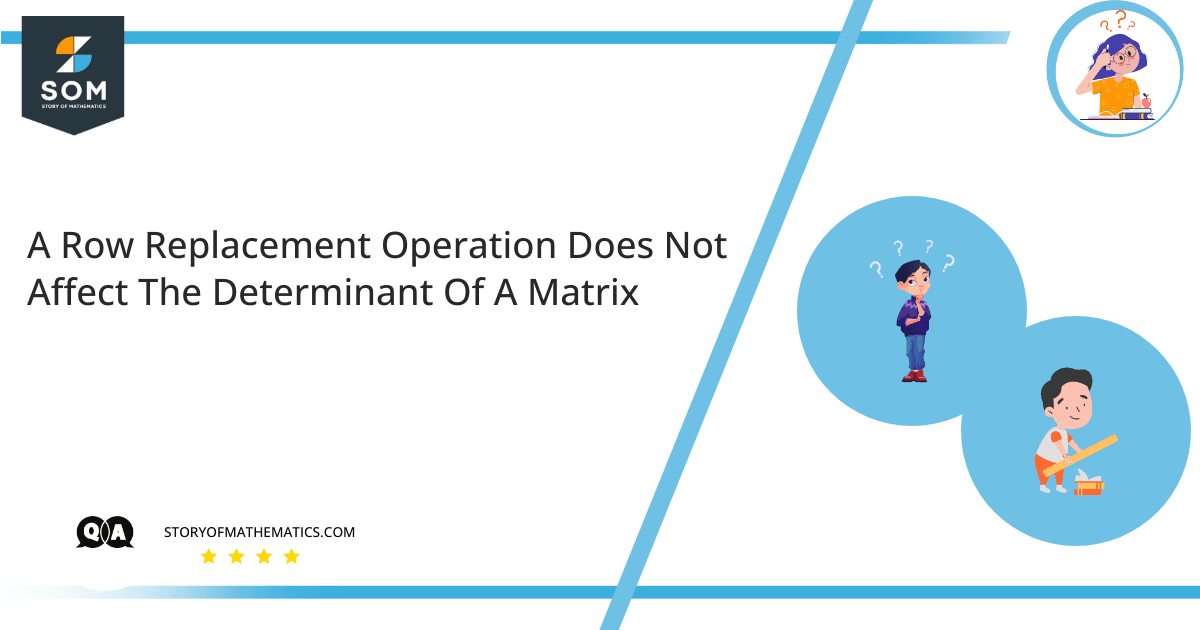
- A row replacement operation does not affect the determinant of a matrix.
- The determinant of $A$ is the product of the pivots in any echelon form $U$ of $A$, multiplied by $(-1)^r$, where $r$ is the number of row interchanges made during row reduction from $A$ to $U$.
- If the columns of $A$ are linearly dependent, then $\det A=0$.
- $\det (A+B)=\det A+\det B$.
This question aims to identify the true or false statements from the given statements.
A matrix is a collection of numbers that are organized in columns and rows to constitute a rectangular array. The numbers are referred to as entries or the elements of a matrix. The matrix dimensions are symbolized by $m\times n$, where $m$ denotes the number of rows and $n$ denotes the number of columns. The notation $m\times n$ is also known as the order of the matrix.
A null matrix contains only zero entries. It may possess any order. A matrix containing only one row is said to be a row matrix. Its elements are arranged as $1 \times n$, where $n$ represents the total number of columns. Similarly, a column matrix contains a single column and can be represented as $m\times 1$, where $m$ represents the specific number of rows.
When the number of columns equals the number of rows, such a matrix is known as a square matrix. A diagonal matrix is one having entries only in the diagonal and is also a square matrix. Other types of square matrices include an upper triangular matrix which has all the entries below the left-right diagonal as zero. Similarly, a lower triangular matrix has zero entries above the left-right diagonal.
Expert Answer
The first statement “A row replacement operation does not affect the determinant of a matrix,” is true since the value of the determinant remains unchanged by the addition of the multiple of one row to the other.
The second statement “The determinant of $A$ is the product of the pivots in any echelon form $U$ of $A$, multiplied by $(-1)^r$, where $r$ is the number of row interchanges made during row reduction from $A$ to $U$,” is false.Because their determinants do not equate to zero, this statement applies only to invertible matrices. Since the pivots are characterized as the first nonzero elements in every row of a matrix’s row echelon form, their product will be a nonzero number as well.
The third statement “If the columns of $A$ are linearly dependent, then $\det A=0$,” is true since $A$ will be a non-invertible matrix.
The fourth statement “$\det (A+B)=\det A+\det B$,” is false since according to the properties of determinants, $\det (A+B)\neq\det A+\det B$.
Example
Let $A=\begin{bmatrix}2 & 0\\0& 2\end{bmatrix}$ and $B=\begin{bmatrix}1 & 0\\0& 1\end{bmatrix}$.
Prove that $\det (A+B)\neq\det A+\det B$.
Solution
$\det(A+B)=\begin{vmatrix}3 & 0\\0& 3\end{vmatrix}$
$=3\times 3+0\times 0=9$
Also, $\det A=4$ and $\det A=1$
So, $\det A+\det B=5$
Hence, $\det (A+B)\neq\det A+\det B$.
